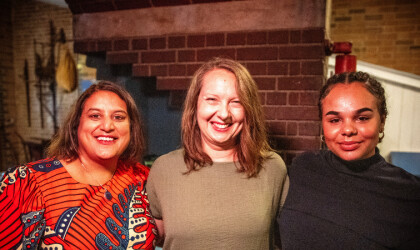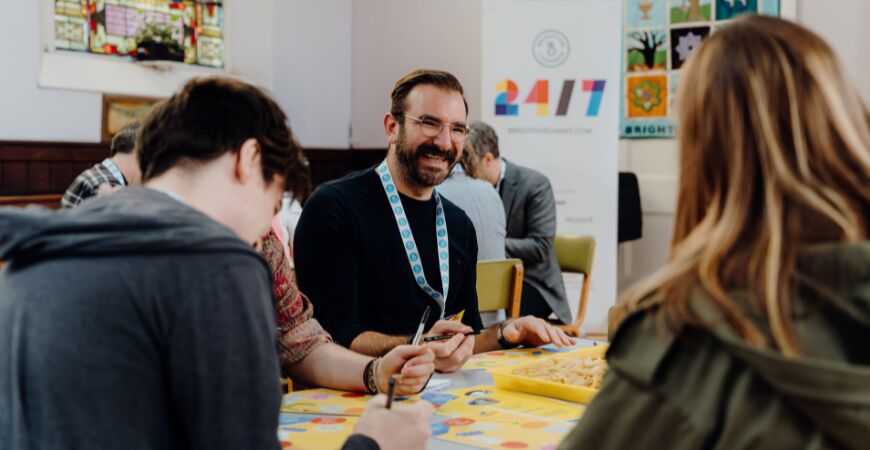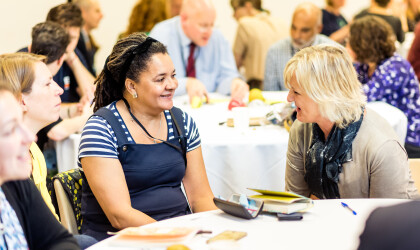

Fri 07 / 02 / 25
Q&A: Disability Confidence - Beyond a badge for inclusive business success
For our first Q&A of the year Sarah Springford, CEO of Brighton Chamber, talks to Maya Woodley, Director of Operations and People at Diversity and Ability – a locally based organisation led by and for Disabled people, aiming to create inclusive workplace cultures through support and training. They discussed the Disability Confident Scheme and actionable strategies for businesses of all sizes to become more disability inclusive; the benefits of these inclusive cultures include driving recruitment, retention and creative growth.
By Anna Langdon of Brighton Chamber
What is the Disability Confident Scheme and what does it entail for organisations?
The Disability Confident Scheme is a government initiative designed to help businesses recruit, retain and support Disabled employees. It consists of three levels:
- Level 1: Disability Confident Committed – Organisations make a public commitment to inclusive practices.
- Level 2: Disability Confident Employer – Businesses take tangible actions to improve workplace inclusion.
- Level 3: Disability Confident Leader – Organisations actively champion disability inclusion both internally and externally.
The scheme involves completing each level before moving on to the next, with each level having a number of steps to demonstrate action taken to recruit, engage and develop Disabled people within the organisation.
Why does the Disability Confident Scheme matter?
The scheme is vital for fostering a more inclusive workforce. It ensures that businesses not only comply with legal requirements but also recognize the value of diverse talent. By participating, organisations can help reduce employment barriers for Disabled people, creating fairer access to opportunities.
What are the benefits and challenges of the Disability Confident Scheme for organisations?
Joining the Disability Confident Scheme has several advantages. These include access to a wider talent pool with valuable skills and new perspectives, higher employee retention with lower turnover rates and fostering a fair and supportive work environment.
One of the primary challenges is ensuring that organisations treat it as a continuous journey rather than a final destination. Many businesses sign up but fail to embed ongoing improvements. The scheme requires consistent effort and commitment.
What are some practical steps small businesses can take to be more disability inclusive?
Start with what your business already does and get creative about improvements. Involve your team members with a passion for inclusion in the process. Practical steps to consider include:
- Flexible work arrangements – offering remote work, adaptable hours, or alternative application methods.
- Inclusive hiring practices – using accessible job descriptions and ensuring fair interview processes.
- Accessibility audits – reviewing websites, office spaces, and communication tools for barriers.
It is important to model best practice around inclusion and celebrating differences.
Beyond ticking boxes, true inclusion comes from fostering a culture that values diversity. There is no one-size-fits-all, adjustments should be made on a case-by-case basis.
What’s next? How can employers take the first steps towards disability confidence?
Start small – review existing policies, speak with employees and implement simple accessibility improvements. Businesses can also take advantage of resources offered by organisations like Diversity and Ability, Acas, and the Business and Intellectual Property Centre (BIPC).
Finding further resources
- If you’re feeling ready to become Disability Confident, Maya has provided their Guide to Disability Confidence, which includes examples of how Diversity & Ability support organisations to achieve Disability Confident Leader status.
- You can download the criteria and checklist for the Employer Disability Confident Scheme from here and consider the different levels of disability confidence here.
- Diversity & Ability’s CEO, Atif Choudhury, wrote a useful article on how to avoid any ‘backlash’ on proposed adjustments here.
- Support Groups that advocate for people with learning disabilities in Brighton & Hove include, Speak Out, Possibility People, POhWER.
- Maya has also recommended the group A Little Poorly Brighton.
- For this blog, we have used identity-first language, rather than person-first language. On this, Maya says that ‘The social model of disability outlines the reality that disabled people experience barriers put in place by society, and inaccessible systems, not by who they inherently are. So we choose to acknowledge this by using identity-first language, people become disabled by their surroundings and society. 'Disabled person' acknowledges the active role that society plays in enforcing the barriers people face.' To find out more, please see the blogs that Maya shared with us below:
- A half-hearted adoption of the social model does more harm than good.
- For our blog, we used the Capital D Disabled, please read about this more here – What’s the difference between Capital D Disabled and lowercase d disabled?
- Social Model of Disability: Language.
With special thanks to Maya from Diversity and Ability for leading the session.
Another huge thank you to our Q&A Sponsor, Business & IP Centre Sussex and Gemma Miller for taking the time to discuss the support the BIPC can provide for businesses, including workshops, webinars, one-to-one consultations and access to business databases.
If you want to contribute to the Chamber blog, contact us on hannah@brightonchamber.co.uk



